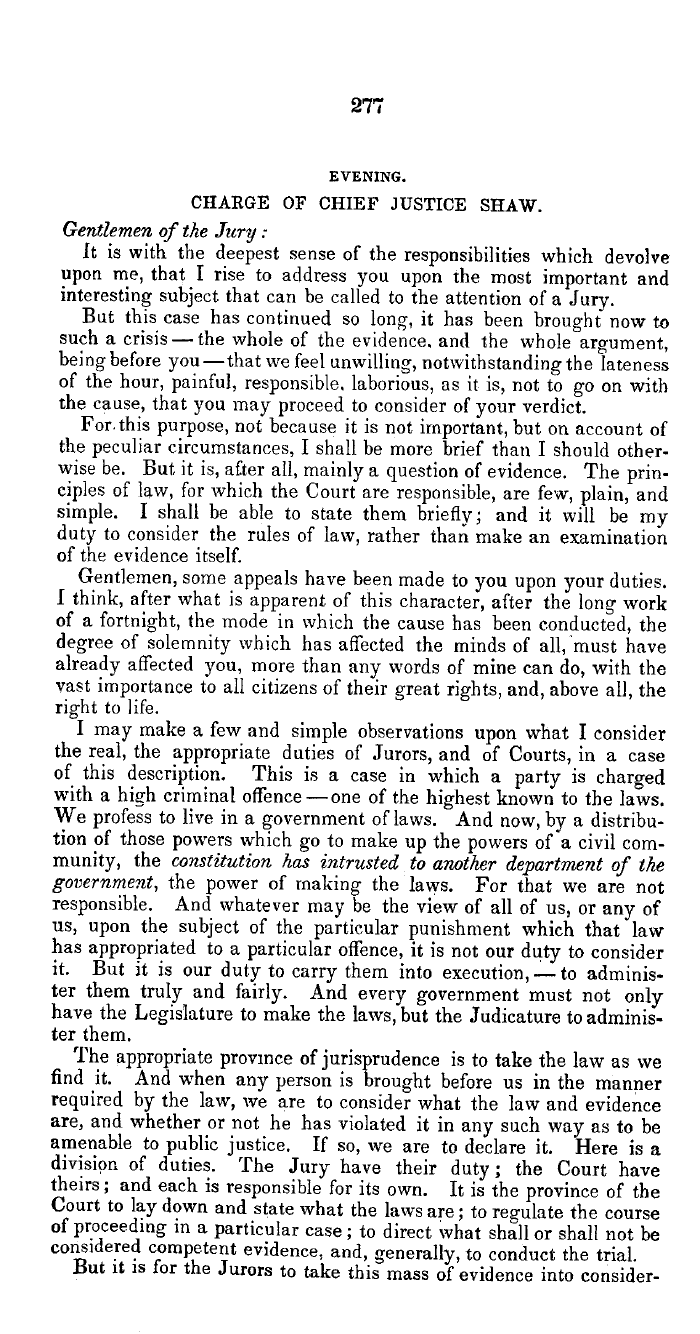|
277
EVENING.
CHARGE OF CHIEF JUSTICE SHAW.
Gentlemen of the Jury
It is with the deepest sense of the responsibilities which devolve
upon me, that I rise to address you upon the most important and
interesting subject that can be called to the attention of a Jury.
But this case has continued so long, it has been brought now to
such a crisis-the whole of the evidence, and the whole argument,
being before you-that we feel unwilling, notwithstanding the lateness
of the hour, painful, responsible, laborious, as it is, not to go on with
the cause, that you may proceed to consider of your verdict.
For.this purpose, not because it is not important, but on account of
the peculiar circumstances, I shall be more brief than I should other-
wise be. But it is, after all, mainly a question of evidence. The prin-
ciples of lbw, for which the Court are responsible, are few, plain, and
simple. I shall be able to state them briefly; and it will be my
duty to consider the rules of law, rather than make an examination
of the evidence itself.
Gentlemen, some appeals have been made to you upon your duties.
I think, after what is apparent of this character, after the long work
of a fortnight, the mode in which the cause has been conducted, the
degree of solemnity which has affected the minds of all, must have
already affected you more than any words of mine can do, with the
vast importance to all citizens of their great rights, and, above all, the
right to life.
I may make a few and simple observations upon what I consider
the real, the appropriate duties of Jurors, and of Courts, in a case
of this description. This is a case in which a party is charged
with a high criminal offence-one of the highest known to the laws.
We profess to live in a government of laws. And now, by a distribu-
tion of those powers which go to make up the powers of a civil com-
munity, the constitution has intrusted to another department of the
government, the power of making the laws. For that we are not
responsible. And whatever may be the view of all of us, or any of
us, upon the subject of the particular punishment which that law
has appropriated to a particular offence, it is not our duty to consider
it. But it is our duty to carry them into execution, - to adminis-
ter them truly and fairly. And every government must not only
have the Legislature to make the laws, but the Judicature to adminis-
ter them.
The appropriate province of jurisprudence is to take the law as we
find it. And when any person is brought before us in the manner
required by the law, we are to consider what the law and evidence
are, and whether or not he has violated it in any such way as to be
amenable to public justice. If so, we are to declare it. Here is a
division. of duties. The Jury have their duty ; the Court have
theirs; and each is responsible for its own. It is the province of the
Court to lay down and state what the laws are; to regulate the course
of proceeding in a particular case ; to direct what shall or shall not be
considered competent evidence; and, generally, to conduct the trial.
But it is for the Jurors to take this mass of evidence into consider-
|

